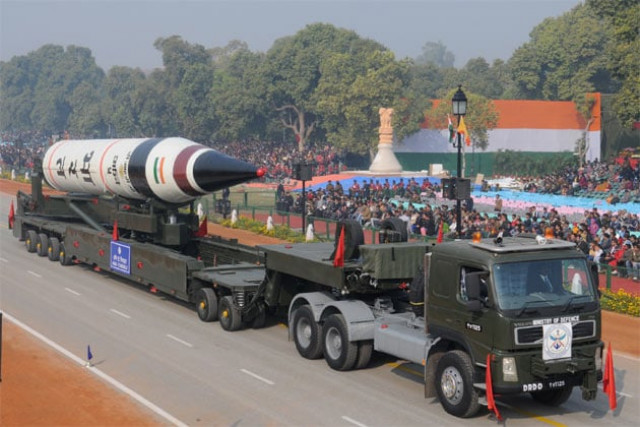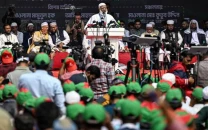India shifting focus of nuclear strategy from Pakistan to China: study
American experts believe New Delhi is constantly modernising its nuclear arsenal to counter Chinese influence

American experts believe New Delhi is constantly modernising its nuclear arsenal to confront Chinese influence. PHOTO: AFP / FILE
“India continues to modernise its nuclear arsenal, with at least four new weapon systems now under development to complement or replace existing nuclear-capable aircraft, land-based delivery systems, and sea-based systems,” said two top American nuclear experts in the July-August issue of digital journal After Midnight.
“India is estimated to have produced enough plutonium for 150–200 nuclear warheads but has likely produced only 120–130,” wrote Hans M Kristensen and Robert S Norris in the article Indian nuclear forces 2017.
A potential shift in India’s nuclear strategy
The study suggests that the nuclear armed nation currently operates seven nuclear-capable systems, including two aircraft, four land-based ballistic missiles and one sea-based ballistic missile with at least four more systems in the development phase. “The development programme is in a dynamic phase, with long-range land- and sea-based missiles emerging for possible deployment within the next decade. “
The report further reveals that India is estimated to have produced approximately 600 kilogrammes of weapon-grade plutonium, however, not all the material has been converted into nuclear warheads, sufficient for 150–200 nuclear warheads. “It will need more warheads to arm the new missiles it is currently developing.”
‘Decoupling’ nuclear strategy
While India has traditionally been focused on deterring Pakistan, its nuclear modernisation indicates that it is putting increased emphasis on its future strategic relationship with China, claimed the nuclear experts. “That adjustment will result in significantly new capabilities being deployed over the next decade that may influence how India views nuclear weapons’ role against Pakistan.”
India and the politics of nonproliferation
Quoting a scholar, the report said: “We may be witnessing what I call a ‘decoupling’ of Indian nuclear strategy between China and Pakistan. The force requirements India needs in order to credibly threaten assured retaliation against China may allow it to pursue more aggressive strategies – such as escalation dominance or a ‘splendid first strike’ – against Pakistan.”
Explaining the possibilities of New Delhi’s use of nuclear weapons against Islamabad, the report referred to the 2016 remarks of then-Indian defence minister Manohar Parrikar in which he questioned his country’s no-first-use nuclear policy.



















COMMENTS
Comments are moderated and generally will be posted if they are on-topic and not abusive.
For more information, please see our Comments FAQ